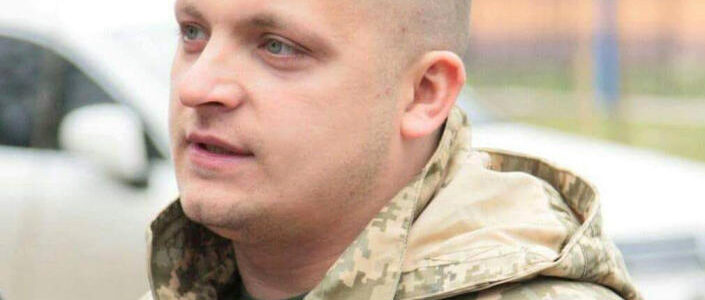
It was an especially inspiring story of Ukrainian bravery, in a war replete with many of them. In video that spread quickly online on March 2, Artem Semenikhin, the mayor of the small city of Konotop, in northeastern Ukraine, stood on a planter outside the City Council and announced to a crowd that Russian soldiers had told him they would “raze the city to the ground with their artillery” if it did not surrender. Then Semenikhin asked the crowd whether they wanted to fight anyway, and the response was overwhelmingly in favor.
The video was picked up by Western media outlets including Newsweek, the Daily Mail and the New York Times, which also showed a video of armed Russian troops being jeered by Konotop residents. Semenikhin was also featured in a “PBS NewsHour” segment, in which he referred to the Russian troops as “cockroaches.”

There was just one thing missing from those accounts: the fact that Semenikhin is a member of the far-right, ultranationalist Ukrainian political party Svoboda, which emerged in 2004 from the former Social-National Party of Ukraine.
In 2015, shortly after Semenikhin took office, the Jerusalem Post reported that he “refused to fly the city’s official flag at the opening meeting of the city council because he objected to the star of David emblazoned on it.” The newspaper also alleged he uses white supremacist dog whistles.

One sharp-eyed observer on Twitter noticed that in Semenikhin’s interview with PBS, conducted remotely via video, one can see a painting of Ukrainian nationalist icon Stepan Bandera in the background. During World War II, Bandera led the Ukrainian Insurgent Army, which collaborated with Nazi Germany and killed Polish and Jewish civilians. At the time, Nazi troops were invading the Soviet Union, which Ukrainian nationalists were hoping to break away from. Bandera later had a falling out with the Nazi regime and was imprisoned in a concentration camp. He remains a highly controversial figure in Ukraine. After Semenikhin was elected in 2015, he replaced the portrait in the mayor’s office of then-Ukrainian President Petro Poroshenko with one of Bandera.
As a pretext for his invasion, Russian President Vladimir Putin has repeatedly sought to connect the entire Ukrainian government to Nazis, vowing to “de-Nazify” the Kyiv regime. But Putin’s claim is absurd, based on the facts: Semenikhin’s city of Konotop had only about 80,000 people before the war, while Ukrainian President Volodymyr Zelensky is one of the few Jewish leaders on the world stage and says he had many relatives killed in the Holocaust.
Russia has been lodging this false accusation for years. In 2014, Russian state propaganda claimed the Maidan Revolution was also backed by Nazis as the pro-Western protesters toppled Russian-backed President Viktor Yanukovych. Experts on Ukraine characterized that assertion as “entirely baseless,” according to U.S. News & World Report.
That being said, like many European countries, Ukraine does have far-right, nationalist political parties with racist tendencies. Svoboda, Semenikhin’s party, has had a number of incidents that drew widespread condemnation.
Svoboda’s leader, Oleh Tyahnybok, has been accused of racism and antisemitism for such comments as saying Ukraine was headed by a “Muscovite-Jewish mafia.” On April 20, 2018 — Adolf Hitler’s birthday — the youth movement of Svoboda, C14, destroyed a Roma settlement in Kyiv by driving out its residents and burning down their tents.
It’s worth noting, however, that Svoboda no longer holds any seats in Ukraine’s parliament, whereas far-right nationalists hold seats in the parliaments of at least 19 other European countries, including Hungary, Austria, Switzerland and Denmark.
CRedit: Yahoo news
